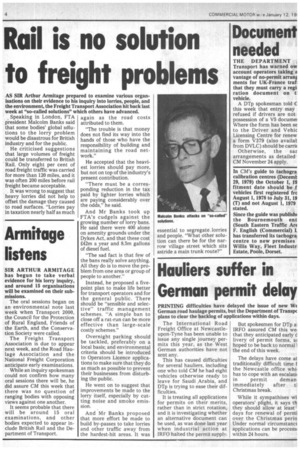Rail is no solution to freight problems
Page 6

If you've noticed an error in this article please click here to report it so we can fix it.
AS SIR Arthur Armitage prepared to examine various organisations on their evidence to his inquiry into lorries, people, and the environment, the Freight Transport Association hit back last week at "so-called solutions" which others have advanced.
Speaking in London, FTA president Malcolm Banks said that some bodies' global sdludons to the lorry problem would be disastrous for British industry and for the public.
He criticised suggestions that large volumes of freight could be transferred to British Rail. Only eight per cent of road freight traffic was carried for more than 120 miles, and it was often 200 miles before rail freight became acceptable.
It was wrong to suggest that heavy lorries did not help to offset the damage they caused to road surfaces. "Lorries pay in taxation nearly half as much again as the road costs attributed to them.
"The trouble is that money does not find its way into the hands of those who have the responsibility of building and maintaining the road network."
He accepted that the heaviest lorries should pay more, but not on top of the industry's present contribution.
"There must be a corresponding reduction in the tax paid by lighter lorries which are paying considerably over the odds," he said.
And Mr Banks took up FTA's cudgels against the growing number of lorry bans. He said there were 400 alone on amenity grounds under the Dykes Act, and that these cost £42m a year and 8.5m gallons of diesel fuel.
"The sad fact is that few of the bans really solve anything. All they do is to move the problem from one area or group of people to another."
Instead, he proposed a fivepoint plan to make life better for transport operators and for the general public. There should be "sensible and selective" traffic management schemes. "A simple ban to close off a rat-run can be more effective than large-scale costly schemes."
Overnight parking should be tackled, preferably on a local basis; and environmental criteria should be introduced to Operators Licence applications to make sure that they do as much as possible to prevent their businesses from disturbing the public.
He went on to suggest that improvements be made to the lorry itself, especially by cutting noise and smoke emission.
And Mr Banks proposed that more effort be made to build by-passes to take lorries and other traffic away from the hardest-hit areas. It was essential to segregate. lorries and people. "What other solution can there be for the narrow village street which sits astride a main trunk route?"












































































































